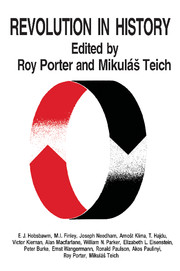Book contents
- Frontmatter
- Contents
- Notes on contributors
- Introduction
- 1 Revolution
- 2 Revolution in antiquity
- 3 Social devolution and revolution: Ta Thung and Thai Phing
- 4 The bourgeois revolution of 1848–9 in Central Europe
- 5 Socialist revolution in Central Europe, 1917–21
- 6 Imperialism and revolution
- 7 Socio-economic revolution in England and the origin of the modern world
- 8 Agrarian and industrial revolutions
- 9 On revolution and the printed word
- 10 Revolution in popular culture
- 11 Revolution in music – music in revolution
- 12 Revolution and the visual arts
- 13 Revolution and technology
- 14 The scientific revolution: a spoke in the wheel?
- 15 The scientific-technical revolution: an historical event in the twentieth century
- Index
6 - Imperialism and revolution
Published online by Cambridge University Press: 05 February 2015
- Frontmatter
- Contents
- Notes on contributors
- Introduction
- 1 Revolution
- 2 Revolution in antiquity
- 3 Social devolution and revolution: Ta Thung and Thai Phing
- 4 The bourgeois revolution of 1848–9 in Central Europe
- 5 Socialist revolution in Central Europe, 1917–21
- 6 Imperialism and revolution
- 7 Socio-economic revolution in England and the origin of the modern world
- 8 Agrarian and industrial revolutions
- 9 On revolution and the printed word
- 10 Revolution in popular culture
- 11 Revolution in music – music in revolution
- 12 Revolution and the visual arts
- 13 Revolution and technology
- 14 The scientific revolution: a spoke in the wheel?
- 15 The scientific-technical revolution: an historical event in the twentieth century
- Index
Summary
‘Established custom’, Dr Johnson wrote after his tour of Scotland, reflecting on the Union of 1707, ‘is not easily broken, till some great event shakes the whole system of things, and life seems to recommence upon new principles.’ At another point in his narrative he looked further back, to the years of the Commonwealth, and thought of brute force as a mainspring of historical progress. ‘What the Romans did to other nations, was in a great degree done by Cromwell to the Scots; he civilized them by conquest, and introduced by useful violence the arts of peace.’ We may qualify this by recalling Milton's dictum that what conquerors like the Romans brought to peoples like the Britons might be either elevating, or debasing and enslaving.
There is room for much disagreement over the relative significance in history of a society's internal pulses and the influences reaching it from outside. It is a problem bearing on all world history, and in a special degree on the story of conquests and empires, the effects on one people of subjugation by another. This ubiquitous phenomenon took on a new character in modern times, in the centuries of Western ascendancy marked by the coming of capitalism and the accompanying growth of technology, thanks to which conquerors have always had – as they did not always have in earlier times – a superiority at least on the material side of life. What gains or losses have resulted for the many countries subjected to Western occupation or interference is a question all the more important because direct colonial rule has only very recently been coming to an end, and indirect control or ‘neo-colonialism’ is still widespread.
Western thinking has usually favoured the view that colonialism, despite much that is shameful in its record, rescued backward or stagnating societies by giving them better government, and transformed them by drawing them out of isolation into the currents of the world market and a world civilization.
- Type
- Chapter
- Information
- Revolution in History , pp. 121 - 144Publisher: Cambridge University PressPrint publication year: 1986



